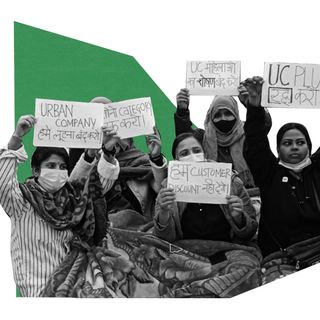Just because a woman is “capable” of earning a living for herself, does not absolve her estranged husband from providing her with monetary support after divorce, the Delhi High Court ruled this week.
In the present case, a man had challenged an order passed by a family court in 2018, directing him to pay maintenance to his divorced wife. He argues that since she was employed as a teacher in the past, she would be able to simply go back to earning money to support herself financially.
His wife — the respondent — argued that she was employed “only for a short period and the salary she was receiving was not enough to sustain herself and live as per the same standard as she lived during her marriage.”
Justice Subramonium Prasad, who was hearing the matter, stated, “Many a times, wives sacrifice their career only for the family.”
As such, it is not equitable to not provide her with any degree of financial support given that they can lose out on years of work experience while performing unpaid labor at home. This labor enables their husbands to engage in paid work outside the home — which makes her labor her contribution to the couple’s overall standard of living. It is this labor, moreover, that makes their family’s income as much hers as it is the husband’s
Stay-at-home spouses “create income, not only by performing tasks that you’d have to pay for otherwise, but by freeing up money to pay for other expenses or to put into savings,” Hollis Colquhoun, an accredited financial counselor and financial survival expert for women, had told Forbes in 2011.
In fact, just last year, a court in the U.K. decided to pay a woman in excess of 50% of the parties’ assets as compensation for “relationship-generated disadvantage.” This is because the woman took a step back in her legal career to assume the lead childcare role in her marriage.
Related on The Swaddle:
Marital Rape Is a Valid Ground for Claiming Divorce, Kerala HC Says in Landmark Judgment
Explaining the rationale behind paying maintenance to women who are capable of earning their own living, Jonathan Day, a senior associate solicitor in London said, “A straight 50/50 split may not meet one party’s needs. For example, if you have a pot of £200,000 and divide that equally, a party who has a lower earning capacity — typically because they have paused or sacrificed their career progression in order to care for children — may be unable to get a big enough mortgage to rehouse themselves in an appropriate area.”
In 2013, the United Nations Committee on the Elimination of Discrimination against Women, or CEDAW, adopted a General Recommendation titled “Economic Consequences of Marriage, Family Relations, and their Dissolution,” which focuses on protecting women’s equal rights to property once their marriage ends — either due to divorce or death of their spouses.
“[I]f they can no longer depend on their husbands for financial support and face discriminatory family laws that may force women out of their homes, they are at an increased risk of falling into the cycle of poverty,” the Committee stated.
Ruth Halperin-Kaddari, a CEDAW expert was contributed to framing General Recommendation, further noted that, “States must fully acknowledge the many forms of women’s contribution to the economic well-being of their families and see to it that this contribution is fully recognized when the relationship ends.”
In the present case, however, the petitioner also alleged that his wife was cheating on him with his workplace superior. However, he couldn’t prove the allegation. In the meantime, his wife argued that her husband was “an uncaring spouse who neglected her and [their] children throughout the marriage and when she decided to live separately, [he] foisted the wild charge of adultery to avoid paying maintenance to her.”
Since the allegation wasn’t proven, the court directed the petitioner to pay maintenance to his estranged wife. The judge also noted, however, that “if it is conclusively proved that the respondent was living in adultery and was not entitled to maintenance at all, the [trial court] can… order for [the] return of the maintenance amount if it deems it fit… keeping in mind the object of [the law] is to prevent vagrancy and destitution of a deserted wife.”




